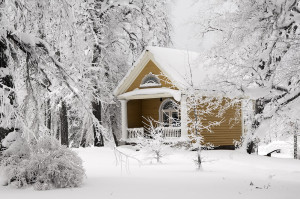 December brings with it a lot of tasks that you need to complete to keep your home comfortable and secure. It is also the right time to prepare your home improvement plans for the coming year. The first big snowfall of the season usually hits in December. This annual ritual also gives you an opportunity to learn a few things about your home.
December brings with it a lot of tasks that you need to complete to keep your home comfortable and secure. It is also the right time to prepare your home improvement plans for the coming year. The first big snowfall of the season usually hits in December. This annual ritual also gives you an opportunity to learn a few things about your home.
Is snow melting fast from your roof? This could suggest that heat from the house is escaping through the roof. Add some attic insulation to prevent this heat loss. Inspect the insulation on the attic floor; and if you discover any gaps, you need to fix them. The attic insulation should be of uniform thickness. Also it has to be dry.w
There are quite a few things that you need to do after a snowfall. For example, you need to clear the walkways. Sprinkle some salt or sand on the snow and use a shovel to remove it. Check your roof to see if there is any ice buildup. If you discover an ice dam, you need to break it up. If you let the ice accumulate along the eaves, melted snow may leak through your roof. Tree branches may break if you do not knock snow from them.
To prevent your pipes from breaking, you should consider blocking all crawl space vents on the north-side with pieces of plywood. You may let the bathtub and sink faucets trickle slowly. This will prevent the pipes from freezing especially on those days when you turn your heating system off because you are away.
If you use an oil burner, you can save money and fuel by cleaning parts of the burner yourself. Cut off the power supply to the system and remove the blower cover. Now you have to dust the blower blades. Pour some oil to lubricate the motor. If you are really handy, you can also replace the filter and clean the strainer.
If you have a forced air distribution system, you should inspect the ducts routinely to check for leaks. If you discover leaks, you need to seal them with duct tape. You also need to dust the duct grilles periodically, and get the entire system cleaned annually.
Be tough with rats or mice that invade your home. They may chew your house’s wires and cause a short circuit which can even burn your home down. Buy traps of appropriate sizes to catch the rodents.
Make sure that your emergency kit is well-equipped. You must have blankets, first-aid kits, gallons of potable water, a radio (battery-powered), candles, matches, flashlights and handy tools for turning off water and gas lines. If the winters in your area are extremely cold, you should have a backup heating system. It could be a backup generator or a wood stove. If your house is in an area prone to experiencing strong hurricanes, you should keep sheets of plywood to protect your windows. People living in earthquake-vulnerable areas must have food and water to last a week. Campers should keep their camping supplies near their emergency stash.
Winter is the right time to create a list of things you would like to change in your home. If you just moved into your home, you should live in it for at least one year before undertaking any major remodel. Watch how your house interacts with your surroundings through the four seasons. This will give you a better understanding of what you really need to change.
Home Loan Advisor can analyze your property, current market conditions, local market comps, and other variables in our proprietary algorithm as well as match you with potential lenders! To assist you in the refinancing process, you can get a free home value report from Neighborhood IQ and find out what your home is really worth.
